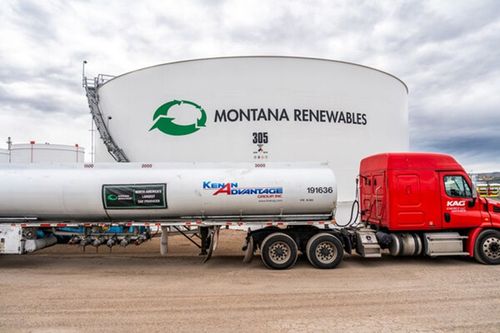Montana Renewables delivers first shipment of SAF for Detroit Metropolitan Airport

A shipment of 7,000 gallons of sustainable aviation fuel was delivered to Dearborn, Michigan from Montana Renewables, LLC. The SAF will be transferred to Detroit Metropolitan Airport via pipeline to fuel Delta flights. / SOURCE: Calumet Inc.
October 24, 2024
BY Calumet Inc.
For the first time, the Detroit Metropolitan Airport (DTW) will have the opportunity to use sustainable aviation fuel (SAF), thanks to Montana Renewables LLC, the largest SAF producer in North America. MRL has delivered its first shipment of 7,000 gallons of SAF to Dearborn, Michigan's Buckeye Pipeline facility. From there, the fuel will be transported to the airport via pipeline. MRL produced and blended the SAF, which will be used by Delta Air Lines.
"Supplying the SAF to DTW marks another significant milestone in the decarbonization of air travel," said Bruce Fleming, CEO of MRL. "Not only does it bring SAF to Detroit flights, but we are especially pleased to pioneer camelina oil as a non-food renewable that provides additional cash crop potential for farmers."
Advertisement
Advertisement
Related Stories
MOL Group has produced a diesel fuel containing hydrotreated vegetable oil (HVO), and sustainable aviation fuel (SAF) at the refinery of Slovnaft in Bratislava. The quality of the products has been verified by radioisotope analysis.
More than 1.76 billion renewable identification numbers (RINs) were generated under the Renewable Fuel Standard in January, down from 1.91 billion generated during the same period of 2024, according to data released by the U.S. EPA on Feb. 20.
The U.S. EPA on Feb. 20 released updated small refinery exemption (SRE) data showing that 13 previously denied SRE petitions for Renewable Fuel Standard compliance years 2021 and 2022 are being reconsidered. No new SRE petitions were filed.
OMV Petrom has announced the start of construction for a sustainable aviation fuel (SAF) and renewable diesel (HVO) production unit at the Petrobrazi refinery in Romania. The new facility will have an annual capacity of 250,000 tons.
CVR pauses development of potential SAF projects pending regulatory, tax credit clarity
CVR Energy Inc. released fourth quarter financial results on Feb. 18, reporting reduced renewable diesel production. The company also said it is pausing development of SAF capacity pending clarity on government subsidies.
Upcoming Events










